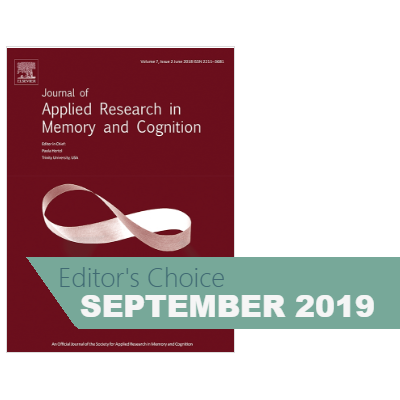JARMAC Editor's Choice: September 2019
/A Unified Cognitive/Differential Approach to Human Intelligence: Implications for IQ Testing
AUTHORS: KRISTOF KOVACS & ANDREW R.A. CONWAY
Success in various cognitive activities is correlated: those who are better in one area (such as reading comprehension) are usually better in others too (such as solving mathematical operations). This has led to the idea that these activities all depend on the same general cognitive ability. However, in cognitive psychology and neuroscience there is ample evidence against this idea. In this paper we present process overlap theory (POT), which explains the correlations among performance measures from different tests without proposing a general cognitive ability. Instead, POT focuses on limitations of cognitive capacity, determined by processes involved in sustained attention, mental flexibility, planning, and the like. The consequences of this approach are discussed, including a focus on specific abilities rather than on global scores in cognitive test results.
The Autobiographical Recollection Test (ART): A measure of individual differences in autobiographical memory.
AUTHORS: DORTHE BERNTSEN, RICK H. HOYLE, & DAVID C. RUBIN
We introduce the Autobiographical Recollection Test (ART) to examine individual differences in how well people think they remember personal events. It comprises seven aspects of recollecting autobiographical memories: reliving, vividness, visual imagery, scene, narrative coherence, life-story relevance, and rehearsal. Desirable psychometric properties of the ART are established by confirmatory factor analyses. Overall, the findings document that autobiographical recollection is a dimension that varies among individuals. The ART forms a reliable and easily administered autobiographical memory test that will help to integrate autobiographical memory research with fields generally concerned with individual differences, such as health and personality psychology.
Does retrieval enhance suggestibility because it increases perceived credibility of postevent information?
AUTHORS: KRISTA D. MANLEY & JASON C. K. CHAN
Recent research has shown that eyewitnesses can become more suggestible if they have been interviewed about a crime before they are exposed to misinformation, a finding termed retrieval-enhanced suggestibility (RES). Here, we tested two theoretical accounts that might explain this effect. The misinformation acceptance account suggests that witnesses who are initially interviewed come to believe the post-event misinformation as truthful (similar to how students treat post-test information as feedback). The test-potentiated learning account posits that initially interviewed witnesses simply learn all post-event information—including misinformation– better than witnesses who were not initially interviewed. Our results support the test-potentiated learning account.


